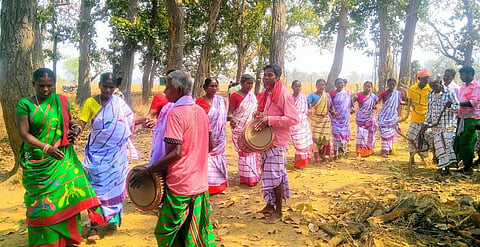

A public interest litigation before the Supreme Court seeks changes in two decades-old laws that restrict the sale of tribal land to non-tribals.
Shyam Prasad Sinha, an 88-year-old resident of Ranchi, has claimed in his petition that he wants the development and progress of Adivasi society, which these two laws inhibit. Ram Lal Roy, counsel for the petitioner, told Down To Earth that the matter could come up for listing after June 20.
The Chota Nagpur Tenancy (CNT) Act was promulgated in British India in 1908. The Santhal Parganas Tenancy (Supplementary provisions) Act was promulgated in newly independent India.
The purpose of both these Acts was to prevent tribal land from being grabbed by non-tribals. Both Acts stipulate that no tribal land should be used for any commercial purposes.
They add that tribals can sell land only to other tribals. Farmers of the same tribe can buy and sell land among themselves but for that, they have to take permission from the district collector.
Also, land cannot be given on lease for more than six years under the Act. No commercial work can be done on the leased land.
This Act is applicable in all the districts of Jharkhand except the Santhal Parganas division. That division consists of six north-eastern districts namely Sahibganj, Godda, Pakur, Deoghar, Dumka and Jamtara.
Lands in this division are known as ‘ryots’ and are passed on to the son-in-law, who lives in the natal house of his wife (ghar jamai in Hindi). Land cannot be sold to non-tribals under the Santhal Parganas Tenancy (Supplementary provisions) Act, 1949, which is considered to be the codification of traditional Santhal customs.
Sinha’s petition blames the Acts for tribals not being able to mortgage their land since banks do not give loans for these lands as collateral owing to the provisions of the laws.
At the same time, more than 70 per cent of tribal land is being bought and sold illegally despite the Acts. There is no authority to prevent this prevention.
The petition terms the laws as ‘British’ and ‘symbols of slavery’. Government schemes for development works cannot be implemented in these areas, due to which these areas remain underdeveloped and poor. The petition states that at least the government should have the right to acquire land so that it can do developmental work.
However, Ram Lal Roy, Sinha’s lawyer, says if the Acts are abolished, it will open the sluice gates for non-tribals to buy these lands.
“I know how bad the condition of the tribals of Jharkhand is. They are very poor. In such a situation, allowing the complete buying and selling of their lands can harm them. Instead, a provision should be made so that their lands can be sold for residential purposes with limited scope and exemption. For this, it is necessary to change the old laws prohibiting the purchase and sale of land,” he told Down To Earth.